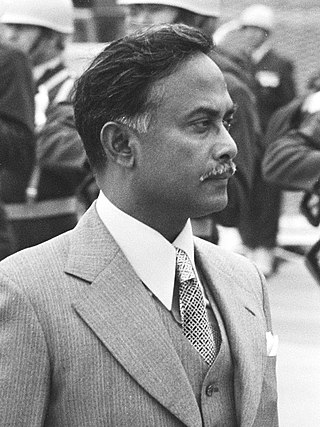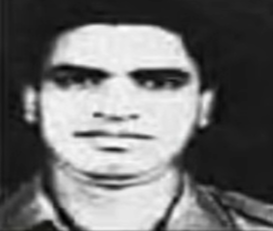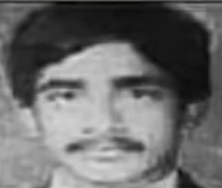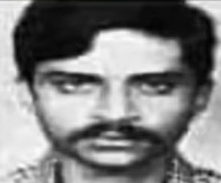
Ziaur Rahman was a Bangladeshi military officer and politician who served as the President of Bangladesh from 1977 until his assassination. He was the founder of the Bangladesh Nationalist Party (BNP) and served as its chairman until his assassination. He previously served as the second chief of army staff from 1975 to 1978 with a minor break.
Abu Taher was a Bengali military serviceman, who served in the Pakistan Army, and later in BDF. He crossed into India around early August and reported to the Indian authorities. After a week screening at Dehradun, India, Taher reported to Kolkata, Bangladesh Provincial government at 8 Theatre Rd. He was ordered to report to Sector 11 of Mukti Bahini under command of Major Ziaur Rahman, he became the sector commander after him. He served in BDF from end of August to 2 November 1971. He was awarded the medal Bir Uttom for his gallantry in the liberation war. He was released from military service by Indian military medical board in Pune, India after his leg was amputated. After independence, he was inducted into the Bangladesh Army for administrative retirement with legacy rank of lieutenant colonel. After settling in with family, the government of Bangladesh appointed him with employment at Kumilla. Later Taher turned into a political activist and leader of the left-wing Jatiyo Samajtantrik Dal.
Khaled Mosharraf, Bir Uttom was a Bangladeshi army officer who is known for his role in the Bangladesh Liberation War and the subsequent coups in post-independence Bangladesh. After deposing Khondakar Mustaq Ahmad in the 3 November 1975 coup, Mosharraf was assassinated on 7 November 1975.

Bangladesh has undergone several changes of government since its independence. Between the first recorded uprising in August 1975 and the last known attempt in December 2011, Bangladesh has been through as many as 29 military Coups.
National Revolution and Solidarity Day was celebrated in Bangladesh on November 7, officially until 2007. This commemorates the November 1975 uprising formed by the people and regular army soldiers of Dhaka Cantonment. Khandkar Mushtaq Ahmed was removed from the Presidency by Brigadier Khaled Mosharraf. This situation led to an uprising, spearheaded by Lt.Col. Abu Taher and his political group Jasad to grab power. It ended the four-day coup organised by Brigadier Khaled Mosharraf, who got killed in the aftermath, while soldiers of Dhaka Cantonment proceeded to release Major General Ziaur Rahman, who was put under house arrest at the inception of the coup by Brigadier Khaled Musharraf.
Syed Faruque Rahman was a coup member involved in toppling the Sheikh Mujib regime in Bangladesh. He was convicted and hanged on 28 January 2010 along with co-conspirators Sultan Shahriar Rashid Khan, A.K.M. Mohiuddin Ahmed, Mohiuddin Ahmed, and Mohammad Bazlul Huda in Dhaka Central Jail, Old Dhaka, for the murder of Sheikh Mujibur Rahman, the founder and first President of Bangladesh. Syed Faruque Rahman and his close ally Khondaker Abdur Rashid were the chief organisers of the assassination of Sheikh Mujibur Rahman on 15 August 1975. He was 2IC of the 1st Bengal Lancers Regiment of the Bangladesh Army who led a group of junior army officers in-order to overthrew the regime of Sheikh Mujibur Rahman and installed Khondaker Mushtaque Ahmed as President of Bangladesh.

Ziaur Rahman, the sixth president of Bangladesh, was assassinated by a faction of officers of Bangladesh Army, on 30 May 1981, in the south-eastern port city of Chittagong. Rahman went to Chittagong to arbitrate in a clash between the local leaders of his political party, the Bangladesh Nationalist Party. On the night of 30 May, a group of officers commandeered the Chittagong Circuit House, a government residence where Rahman was staying, shooting him and several others.
Major General Khaled Mosharraf was assassinated on November 7, 1975. He was a Bangladeshi military officer who was the Sector Commander of Bangladesh Forces Sector 2 and K-Force Brigade Commander during the Bangladesh Liberation War.
K Force was a military brigade of Bangladesh Forces in 1971 headed by Major Khaled Mosharraf as per the direction of the Provisional Government of Bangladesh in exile. The brigade was a part of regular army under the Bangladesh Armed Forces formed with the 4th, 9th and 10th Battalion of East Bengal Regiment.

Abu Taher Mohammad Haider, Bir Uttom was a Bangladesh Army officer and recipient of Bir Uttom, the second highest military award in Bangladesh. He fought in the Bangladesh Liberation War as the second-in-command of the K force under Khaled Mosharraf. Later he became the sector commander of sector-2 from September 22, 1971. After the assassination of the President of Bangladesh, Sheikh Mujib in a military coup; he joined a counter coup led by his former commander Major General Khaled Mosharraf. He was killed in a situation marred with confusion along with Khaled Mosharraf on 7 November 1975 by proponents of a counter coup led by Colonel Abu Taher.

The 15 August 1975 Bangladesh coup d'état was a military coup launched by mid ranking army officers in Bangladesh on 15 August 1975. The officers were part of a conspiracy to assassinate Sheikh Mujibur Rahman, the Founding Father of Bangladesh, who led the independence struggle during the Bangladesh Liberation War and later served as the first and fourth President and later in between his two presidential terms served as the second Prime Minister of Bangladesh from April 1971 until his assassination in August 1975. Sheikh Mujibur Rahman and most of his family members were killed during the coup, with the exception of his two daughters Sheikh Hasina and Sheikh Rehana.
The 7 November 1975 Bangladesh coup d'état was a coup d'état launched by left-wing army personnel in collaboration with left-wing politicians from Jatiya Samajtantrik Dal. The coup resulted in the death of Major General Khaled Mosharraf, who only 3 days prior, led a coup against those involved in the assassination of Sheikh Mujibur Rahman. During the coup, Ziaur Rahman was freed from house arrest, enabling him to seize power and become president.
The 3 November 1975 Bangladesh coup d'état was a military coup d'état led by Major General Khaled Mosharraf to remove the assassins of Sheikh Mujibur Rahman from power.

Deyal is a 2013 political/historical novel by Bangladeshi writer Humayun Ahmed, based on the socio-political crisis in the aftermath of the war of independence of Bangladesh. It was the last novel of the writer and was published one year after his death. The publication of the book was delayed by a High Court verdict.
Khondkar Nazmul Huda was a veteran of the Bangladesh Liberation war. The Bangladesh government awarded him the title of Bir Bikrom for his bravery in the war of independence.
The Biplobi Shainik Sangstha was a clandestine socialist group within the Bangladesh Army, which was active from 1973 to 1975. The BSS was formed by the left-wing party Jatiya Samajtantrik Dal (JSD) and led by Major (dismissed) M.A. Jalil and Lt. Colonel (retired) Abu Taher. The BSS is known for organising the 7 November 1975 coup which enabled Ziaur Rahman to become president.

Mohammad Delwar Hossain was a lieutenant colonel in the Bangladesh Army who had served as a sub-sector commander in sector 6 during the Bangladesh Liberation War. He was subsequently executed for his alleged involvement in the assassination of president Ziaur Rahman in 1981.

Rafiqul Hassan Khan was a Bangladeshi army officer who was executed for this alleged involvement in the assassination of president Ziaur Rahman.

Jamil Haque was a Captain in the Bangladesh Army who was executed for his involvement in the assassination of president Ziaur Rahman.

Mujibur Rahman was a Bangladeshi army officer who was executed for his alleged role in the assassination of president Ziaur Rahman.










